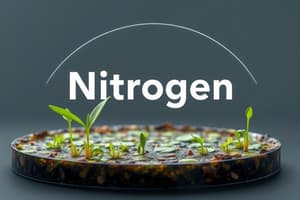Podcast
Questions and Answers
Which process converts atmospheric nitrogen (N2) into a form usable by living organisms?
Which process converts atmospheric nitrogen (N2) into a form usable by living organisms?
- Nitrification
- Ammonification
- Denitrification
- Nitrogen fixation (correct)
What is the primary result of the process known as nitrification?
What is the primary result of the process known as nitrification?
- Production of organic nitrogen compounds
- Conversion of ammonia to nitrite and then nitrate (correct)
- Conversion of ammonia to atmospheric nitrogen
- Absorption of nitrogen by animals
How do animals primarily obtain nitrogen?
How do animals primarily obtain nitrogen?
- Through atmospheric nitrogen absorption
- By the process of denitrification
- From soil nitrogen deposits
- By consuming plants or other animals (correct)
What role does denitrification play in the nitrogen cycle?
What role does denitrification play in the nitrogen cycle?
Which process in the carbon cycle is primarily responsible for removing carbon dioxide from the atmosphere?
Which process in the carbon cycle is primarily responsible for removing carbon dioxide from the atmosphere?
What is a significant human impact on the carbon cycle?
What is a significant human impact on the carbon cycle?
Which of the following best describes eutrophication?
Which of the following best describes eutrophication?
What is the main effect of increased nitrogen levels in ecosystems due to human activities?
What is the main effect of increased nitrogen levels in ecosystems due to human activities?
Flashcards
Ecology
Ecology
The scientific study of interactions between organisms and their surroundings.
Biotic factors
Biotic factors
Living components within an environment, like plants and animals.
Abiotic factors
Abiotic factors
Non-living components of the environment, like sunlight, water, and temperature.
Nitrogen fixation
Nitrogen fixation
Signup and view all the flashcards
Nitrification
Nitrification
Signup and view all the flashcards
Denitrification
Denitrification
Signup and view all the flashcards
Carbon cycle
Carbon cycle
Signup and view all the flashcards
Photosynthesis
Photosynthesis
Signup and view all the flashcards
Study Notes
Ecology
- Ecology is the scientific study of the interactions between organisms and their environment.
- It's a broad field encompassing multiple levels of biological organization, from organisms to ecosystems.
- Key factors in ecology include biotic factors (living things) and abiotic factors (non-living things), such as sunlight, water, temperature, and nutrients.
- Ecological studies examine how organisms adapt to their environment, how populations change over time, and how ecosystems function.
- Important ecological concepts include competition, predation, symbiosis, and energy flow.
- Biodiversity is a critical aspect of ecology, referring to the variety of life on Earth, at all its levels, from genes to ecosystems.
- Ecology has practical applications in conservation biology, environmental management, and sustainable development.
Nitrogen Cycle
- The nitrogen cycle is a biogeochemical cycle that describes the transformation and movement of nitrogen through the environment.
- Nitrogen is essential for life but primarily exists in an unusable form in the atmosphere (N2).
- Nitrogen fixation is the process where atmospheric nitrogen (N2) is converted into ammonia (NH3) by certain bacteria.
- Nitrification is the oxidation of ammonia (NH3) to nitrite (NO2-) and then to nitrate (NO3-) facilitated by other bacteria.
- Plants absorb the usable forms of nitrogen, such as nitrate, from the soil.
- Animals receive nitrogen by consuming plants or other animals.
- Denitrification is the process by which bacteria convert nitrate (NO3-) back into atmospheric nitrogen (N2).
- Human activities, such as the use of fertilizers, have significantly altered the nitrogen cycle.
- Increased nitrogen in ecosystems can lead to eutrophication, harming aquatic life and impacting water quality.
- Understanding the nitrogen cycle is important for sustainable agriculture and environmental protection.
Carbon Cycle
- The carbon cycle is a biogeochemical cycle that describes the flow of carbon between the atmosphere, oceans, land, and living organisms.
- Carbon is essential for life, occurring in various forms, including carbon dioxide (CO2).
- Photosynthesis is a crucial process in the carbon cycle, where plants absorb CO2 from the atmosphere and use it to produce sugars.
- Respiration releases CO2 back into the atmosphere by organisms breaking down sugars for energy.
- Combustion of fossil fuels is a major source of anthropogenic carbon emissions.
- Oceans play a significant role in absorbing CO2 from the atmosphere.
- Carbon is stored in various reservoirs, including forests, soil, and fossil fuels.
- Changes in the carbon cycle, often driven by human activities, can impact climate patterns and global ecosystems.
- Understanding the carbon cycle is critical for addressing climate change and ensuring the long-term health of the planet.
- The carbon cycle involves a variety of processes, including photosynthesis, respiration, decomposition, and the burning of fossil fuels.
Studying That Suits You
Use AI to generate personalized quizzes and flashcards to suit your learning preferences.




